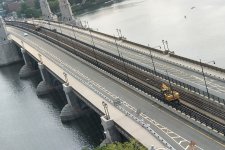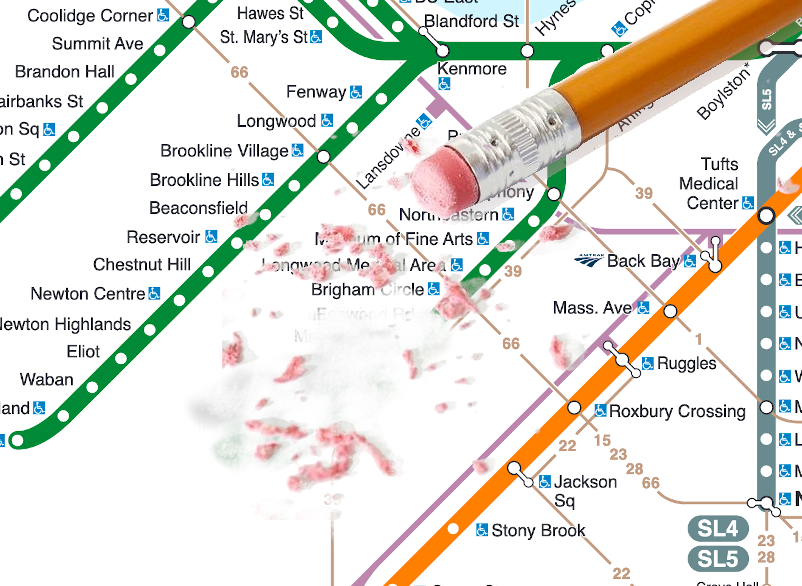You are using an out of date browser. It may not display this or other websites correctly.
You should upgrade or use an alternative browser.
You should upgrade or use an alternative browser.
General MBTA Topics (Multi Modal, Budget, MassDOT)
- Thread starter Waldorf
- Start date
RandomWalk
Senior Member
- Joined
- Feb 2, 2014
- Messages
- 3,330
- Reaction score
- 5,258
The GM update slide deck from the August MBTA board meeting mentioned that the OL signal work is 50% complete and the RL is 57% complete.
Err I'm going to call that not a good thing, at least as far as the Red Line is concerned - by the Oct 6 2023 Weekly progress report, RL signals were at 55% percent. 2 percent in the course of 11 months isn't moving it forward. At least the concomitant OL report was 30%, But the entire OL/RL signals program was supposed to be complete in by fall 2024 - they've since updated that to Fall 2027 on the projects page.The GM update slide deck from the August MBTA board meeting mentioned that the OL signal work is 50% complete and the RL is 57% complete.
Orange Line Transformation Program | Projects | MBTA
Official website of the MBTA -- schedules, maps, and fare information for Greater Boston's public transportation system, including subway, commuter rail, bus routes, and boat lines.
Digital_Islandboy
Active Member
- Joined
- Apr 9, 2010
- Messages
- 400
- Reaction score
- 62
I don't know if this is why but equipment gets on and off the Red Line tracks on the Cambridge-side of Longfellow Bridge where they have a gate to get in/out of the Red Line.The last Red Line closure seems to be pretty successful - even Transit Matter's dashboard today only has a minor slowdown Central -> Kendall (which is the sole slow zone the MBTA tracker flags as a 25pmh+ zone). Otherwise Alewife to Andrew is all clear, and JFK to Ashmont is still holding well. It does seem that once the Braintree branch closure is done we might really be looking at a slow free Red Line.
edit: this is what I get for posting with a stale version of the thread open, rather redundant on my part.
These pics were the weekend / Monday, August 26, 2024 shutdown on RL. I was just watching them race up and down the bridge.
Attachments
-
 IMG_20240826_1143289.jpg2.5 MB · Views: 75
IMG_20240826_1143289.jpg2.5 MB · Views: 75 -
 IMG_20240826_1637264.jpg4.8 MB · Views: 76
IMG_20240826_1637264.jpg4.8 MB · Views: 76 -
 IMG_20240826_1143170.jpg2.1 MB · Views: 71
IMG_20240826_1143170.jpg2.1 MB · Views: 71 -
 IMG_20240826_1143434.jpg2.4 MB · Views: 67
IMG_20240826_1143434.jpg2.4 MB · Views: 67 -
 IMG_20240826_1144070.jpg2.8 MB · Views: 69
IMG_20240826_1144070.jpg2.8 MB · Views: 69 -
 IMG_20240826_1142045.jpg1.2 MB · Views: 66
IMG_20240826_1142045.jpg1.2 MB · Views: 66 -
 IMG_20240826_1143232.jpg2.4 MB · Views: 72
IMG_20240826_1143232.jpg2.4 MB · Views: 72
Delvin4519
Active Member
- Joined
- Oct 8, 2022
- Messages
- 884
- Reaction score
- 1,536
GTFS for Fall 2024 is out, meaning a full analysis of Fall 2024 service changes is now possible.
I finally got around to poking into the pre-COVID MBTA GTFS file from right before the lockdowns hit, pulling out the last pre-COVID, pre-crisis, pre-FTA schedules; the MBTA ran before COVID and the FTA SMI happened. The MBTA has not run a non-crisis, full service schedule, for 4.5 years now.
Here's a comparison of the pre-COVID schedule on the left (2019-2020 ratings), and the Fall 2024 schedule on the right.
As typical these MBTA frequency maps show off peak Sunday schedules, weekday schedules were already mapped by Riverside, and weekdays have more complex schedules with peak, commuter, and specialized variant routes.
The results look pretty mixed to me, but some communities, especially Medford, Malden, and Charlestown, were hit the hardest with the worst service cuts that are still ongoing and will last for the rest of 2024.
Service in Somerville, East Boston, and Dorchester, seem improved a bit more balanced with more balanced off peak schedules, alongside the GLX, today compared to pre-COVID. Cambridge, Everett, and Watertown both saw mixed results between 2019 and today, with service decreased on some routes for increased service on others.
The MBTA Sunday schedule from pre-COVID had 3,084 scheduled bus trips across all routes. For Fall 2024, there are only 2,982 scheduled bus trips on Sundays. The Fall 2024 schedule is still under a net loss of 102 Sunday bus trips compared to pre-COVID. Sunday bus service is approximately at 96% of pre-COVID levels. Subway Sunday service for Fall 2024 is also at 96% of pre-COVID levels. For comparison, TransitMatter's COVID recovery dashboard from early in 2024 still showed weekday service lagging at 85% of pre-COVID service.
Pre-COVID schedule | Fall 2024 schedule |
|---|---|
Last edited:
HelloBostonHi
Senior Member
- Joined
- Apr 17, 2018
- Messages
- 1,482
- Reaction score
- 4,154
What a day, when is that new signal system supposed to be finished by again?
TallIsGood
Active Member
- Joined
- May 30, 2006
- Messages
- 539
- Reaction score
- 129
So why are they expanding free and reduced fare rides if they are $700m in the hole?A rider's guide to the MBTA's looming financial crisis, which could impose massive, unprecedented service cuts if state lawmakers don't take bold action in the next 8 months:

A Rider's Guide to the MBTA's Looming Financial Crisis - Streetsblog Massachusetts
The agency needs $700 million in new state funding to avoid draconian service cuts next year. Governor Healey promises "we're not going back, we're full steam ahead."mass.streetsblog.org
Because the appeal to the legislature for necessary funds to cover all service and the opportunity to provide equity to struggling communities served by the MBTA are two separate goals. Politically, now the MBTA can use this to advocate for those necessary funds by telling the broader public that they'll be forced to cut service and raise costs on struggling communities. "Fund the MBTA or declare a war on poor people" could have some sway in communities where they pride themselves on social justice, regardless of whether it is performative, genuine, or some combination of both.So why are they expanding free and reduced fare rides if they are $700m in the hole?
Last edited:
TallIsGood
Active Member
- Joined
- May 30, 2006
- Messages
- 539
- Reaction score
- 129
But the money still has to come from somewhere. We just raised taxes $1.8b a year for transportation and education.Because the appeal to the legislature for necessary funds to cover all service and the opportunity to provide equity to struggling communities served by the MBTA are two separate goals. Politically, now the MBTA can use this to advocate for those necessary funds by telling the broader public that they'll be forced to cut service and raise costs on struggling communities. "Fund the MBTA or declare a war on poor people" could have some sway in communities where they pride themselves on social justice, regardless of whether it is performative, genuine, or some combination of both.
StreetsblogMASS
New member
- Joined
- May 26, 2023
- Messages
- 51
- Reaction score
- 353
Reduced fares have been in the works for years, and because its participants are expected to ride more often, the fiscal impact is pretty small – the T will get less revenue per ride among program participants, but it will also get a lot more transactions (a 2019 MIT study found that people paying 1/2 price for fares took, on average, 30% more transit trips per week).So why are they expanding free and reduced fare rides if they are $700m in the hole?
So cancelling this one specific program won't come anywhere near to filling a $700 million budget gap. You could just as easily ask the same question about other new programs the T is adding, like the new fare system, or bus network redesign, or South Coast Rail, or all of them combined – and you'd get the same answer: it's not enough.
It's a mistake to think of the $700M budget gap as a spending problem for the MBTA to fix. It's fundamentally a political problem – the result of a State Legislature that has been steadily cutting the MBTA's budget for decades, while also demanding increasing levels of transit service.
That's true, but only $208 million of that has been currently allocated to the MBTA; far short of what is necessary to cover the MBTA's needs. It's well documented that the MBTA is currently underfunded and has been since Forward Funding was implemented in 2000. The millionaire's tax isn't going to cover that gap and a broader solution is required. I mean, transportation in the context of the tax is a broad category and most of the other public transit-specific dollars spent on the tax went to expanding the RTAs budgets while keeping them free at point of service for the same reasons of equity. This program is projected to cost between $23 and $62 million with a pledge from the Governor to cover $45 million. It is, at most, 2.4% of the projected deficit of $696 million. Like @StreetsblogMASS said, this isn't the program to attack.But the money still has to come from somewhere. We just raised taxes $1.8b a year for transportation and education.
TallIsGood
Active Member
- Joined
- May 30, 2006
- Messages
- 539
- Reaction score
- 129
It is a spending problem. I would suggest that expanding to South Coast isn’t cost effective neither is new BEBs when we had trackless trolleys. The new gate system and CRRC cars were handled ‘poorly’. The pensions are a disaster too. Spending hasn’t decreased.Reduced fares have been in the works for years, and because its participants are expected to ride more often, the fiscal impact is pretty small – the T will get less revenue per ride among program participants, but it will also get a lot more transactions (a 2019 MIT study found that people paying 1/2 price for fares took, on average, 30% more transit trips per week).
So cancelling this one specific program won't come anywhere near to filling a $700 million budget gap. You could just as easily ask the same question about other new programs the T is adding, like the new fare system, or bus network redesign, or South Coast Rail, or all of them combined – and you'd get the same answer: it's not enough.
It's a mistake to think of the $700M budget gap as a spending problem for the MBTA to fix. It's fundamentally a political problem – the result of a State Legislature that has been steadily cutting the MBTA's budget for decades, while also demanding increasing levels of transit service.
TallIsGood
Active Member
- Joined
- May 30, 2006
- Messages
- 539
- Reaction score
- 129
I never said it would solve all of the problem. But when the boat is taking on water, you don’t drill another hole in the hull, however small. MBTA is a very poor spender. It is trying to catch up but has been lighting funds on fire for decades.That's true, but only $208 million of that has been currently allocated to the MBTA; far short of what is necessary to cover the MBTA's needs. It's well documented that the MBTA is currently underfunded and has been since Forward Funding was implemented in 2000. The millionaire's tax isn't going to cover that gap and a broader solution is required. I mean, transportation in the context of the tax is a broad category and most of the other public transit-specific dollars spent on the tax went to expanding the RTAs budgets while keeping them free at point of service for the same reasons of equity. This program is projected to cost between $23 and $62 million with a pledge from the Governor to cover $45 million. It is, at most, 2.4% of the projected deficit of $696 million. Like @StreetsblogMASS said, this isn't the program to attack.
themissinglink
Senior Member
- Joined
- Jan 13, 2018
- Messages
- 1,505
- Reaction score
- 3,828

MBTA GM: T on track to eliminate all slow zones by year’s end
General manager of the MBTA Phillip Eng says the transit agency is on track to eliminate slow zones by the end of the year.
www.boston.com
Going into 2025, Eng said the MBTA is focused on “sharing a vision with the public where we see the T going longer term” by laying out a “roadmap.”

Eng says MBTA is considering later night subway service
Eng said Monday on Boston Public Radio, he wants to help people who need more transit options after midnight.
“I’ve been talking with my operations folks regarding the potential for later night service,” Eng said.
I'm very glad to hear all of this.
Last edited:
nortor
New member
- Joined
- Jul 4, 2024
- Messages
- 43
- Reaction score
- 115
I think you have to evaluate each of these projects on their merits, and judge them on the return to society. The MBTA is a public agency that will always lose money when you look at its individual budget (barring it becoming a big real estate developer in some fantasy world). BEB replacement is (probably) not cost-effective in this sense, neither is South Coast Rail with current service. But reduced fares could certainly have benefits to society (in both/either the economic or quality-of-life sense). Certainly, if as this study finds, low-income fare recipients are spending 2-6% of their limited income on transit, halving that is a big deal. This study indicates that in some cases this presents a hindrance to mobility.I never said it would solve all of the problem. But when the boat is taking on water, you don’t drill another hole in the hull, however small. MBTA is a very poor spender. It is trying to catch up but has been lighting funds on fire for decades.
Of course, you could also argue the MBTA has more cost effective ways to spend money. I think that would be a fair debate although it's a pretty inexpensive program and there are also political benefits to the program as mentioned previously. We'd have to have a very detailed discussion to evaluate that, though (and argue about the meaning of cost-effectiveness).
But I also don't think it's right to say the budget gap isn't a spending problem for the T -- the T obviously does have spending problems, particularly on the capital side, as do most (all?) American transit agencies. The T has spent billions of unnecessary dollars on cost-inflated projects like SCR, GLX, AFC 2.0, and new railcars. We can argue that the T needs more funding while at the same time recognizing that they do spend money inefficiently (as do other government funded programs), and also acknowledge the different scopes and impacts of these problems and discussing both the merits of individual programs, ways to make spending more efficient, and ways to make funding more productive.It's a mistake to think of the $700M budget gap as a spending problem for the MBTA to fix. It's fundamentally a political problem – the result of a State Legislature that has been steadily cutting the MBTA's budget for decades, while also demanding increasing levels of transit service.
It doesn't undermine beneficial public programs like transit to discuss how they can be made more cost-effective. Massachusetts does not have unlimited money (though the federal govt may depending on your views), and we SHOULD discuss how we can spend it more efficiently while at the same time advocating for better funding.
Very broadly, I agree. But a lot of the cost blowouts on the projects you mention still come back to the political problems @StreetsblogMASS is mentioning, especially decades of underinvestment in the T. (I really recommend the Transit Costs Project for detailed analysis.) Underinvestment led to a drain of expertise and capacity in the agency, which has left the T unable to efficiently manage construction projects like GLX or SCR. That leads to much higher costs. Without the in-house expertise, the T often has to rely on consultants (managing consultants (managing consultants...)), which is expensive. For something like buying new railcars, other transit agencies around the world will focus on technical merit of bids. But that requires a lot of expertise the T can no longer afford, so it just picks the lowest bidder, which ends up being the most costly in the end.But I also don't think it's right to say the budget gap isn't a spending problem for the T -- the T obviously does have spending problems, particularly on the capital side, as do most (all?) American transit agencies. The T has spent billions of unnecessary dollars on cost-inflated projects like SCR, GLX, AFC 2.0, and new railcars. We can argue that the T needs more funding while at the same time recognizing that they do spend money inefficiently (as do other government funded programs), and also acknowledge the different scopes and impacts of these problems and discussing both the merits of individual programs, ways to make spending more efficient, and ways to make funding more productive.
It doesn't undermine beneficial public programs like transit to discuss how they can be made more cost-effective. Massachusetts does not have unlimited money (though the federal govt may depending on your views), and we SHOULD discuss how we can spend it more efficiently while at the same time advocating for better funding.
And besides the political problem of underfunding, there's the political problem of indifference. Again, the Transit Costs Project is full of detail how an executive office (like the Governor) can keep costs down if they are active and engaged and prioritize transit. A good executive can get permits expedited, or keep other agencies from interfering. They can organize stakeholders, make sometimes-unpopular decisions, and call in favors to keep a project moving and under budget. That's how it works in places where transit projects get finished on time and on budget. Instead, what we've had in Massachusetts is a string of governors who have been indifferent or hostile to public transit. No one is expending any political capital for the sake of public transit. That lets projects drag on, which is really expensive.
So again, I agree with you. The T clearly has major cost overrun problems is needs to address. There are absolutely examples where we can and should expect it to do better immediately. But still, a lot of the really big cost overruns you mention come back to political and underfunding issues.
HenryAlan
Senior Member
- Joined
- Dec 15, 2009
- Messages
- 4,186
- Reaction score
- 4,455
But the MBTA doesn't make these decisions in a vacuum (or at all, as in the case of South Coast Rail). These aren't spending problems, they are funding problems. Beacon Hill mandates that the 'T provide certain services, but doesn't follow through with adequate resources for those services. That's not something the MBTA can control, you are pointing your finger at the wrong problem.It is a spending problem. I would suggest that expanding to South Coast isn’t cost effective neither is new BEBs when we had trackless trolleys. The new gate system and CRRC cars were handled ‘poorly’. The pensions are a disaster too. Spending hasn’t decreased.
Brattle Loop
Senior Member
- Joined
- Apr 28, 2020
- Messages
- 1,167
- Reaction score
- 2,084
It is a spending problem. I would suggest that expanding to South Coast isn’t cost effective neither is new BEBs when we had trackless trolleys. The new gate system and CRRC cars were handled ‘poorly’. The pensions are a disaster too. Spending hasn’t decreased.
The CRRC cars are a particularly bad example for all the reasons @HenryAlan and others have mentioned. The Patrick administration's insistence on them being assembled in Massachusetts (i.e. Springfield) immediately made the project less attractive to all of the potential bidders who had pre-existing final assembly plants elsewhere in the US. And the T correctly understood that one of the Chinese bidders (CSR) was not acceptable on technical grounds and rejected their bid, only for the Chinese state to merge them with the winning CNR, something the T had absolutely no control over and which undoubtedly contributed to that program's misfortunes. None of that was the T's own choices, it was either outside their control entirely or forced upon them by the whims of their political masters.
nortor
New member
- Joined
- Jul 4, 2024
- Messages
- 43
- Reaction score
- 115
Definitely agree, yeah — and I’m familiar with the Transit Costs Project . Although I think it's important to stress the funding issue is just one aspect of the cost problem — it’s not enough to say “just fund transit” but you need to also have a committed governor, expert leadership, and strong institutional structures making good decisions. And T leadership could certainly push for (and implement some of) the proposed reforms in the Transit Costs project.So again, I agree with you. The T clearly has major cost overrun problems is needs to address. There are absolutely examples where we can and should expect it to do better immediately. But still, a lot of the really big cost overruns you mention come back to political and underfunding issues.
Agreed that pinning costs primarily on MBTA leadership is wrong (although in cases like battery buses the issue does stem from there, and they've been at least complicit historically in many spending issues). But the issue is not just funding -- it's in the priorities that Beacon Hill has for spending as well. Reduced fares could be part of that problem, if they were not cost-effective (which again, I think they probably are).But the MBTA doesn't make these decisions in a vacuum (or at all, as in the case of South Coast Rail). These aren't spending problems, they are funding problems. Beacon Hill mandates that the 'T provide certain services, but doesn't follow through with adequate resources for those services. That's not something the MBTA can control, you are pointing your finger at the wrong problem.
Overall, the point I'm trying to make is that talking about cost issues in a reasonable way (which is not just saying the T lights funds on fire) should be a part of the funding discussion.
Eng says MBTA is considering later night subway service
Eng is just on a roll. Here's hoping it can finally be done not half assed. Would be cool to include some CR lines, too, with a last late night train.
Eng is just on a roll. Here's hoping it can finally be done not half assed. Would be cool to include some CR lines, too, with a last late night train.
